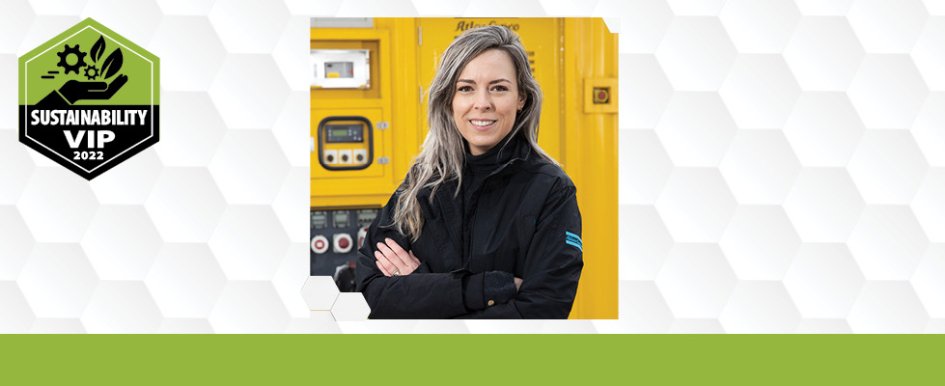
Barbara Gregorio
Product Marketing Manager for Innovative Energies
Atlas Copco
As the world’s attention turns to the ill effects of climate change on the planet, Barbara Gregorio and her employer are striving to make a difference both inside the company and out.
Gregorio works for Atlas Copco, a multinational tool and equipment manufacturer headquartered in Stockholm, Sweden, with more than 43,000 employees in 180 countries.
Atlas Copco used to make diesel-powered generators as part of its product portfolio. But eventually management realized the trend toward hybrid-powered products was growing. They wanted to make cleaner and more sustainable products for the construction industry that were more aligned with where the trends were headed, she said.
“We could not be behind,” said Gregorio. “All of this technology is very new in our sector in construction. But we definitely wanted to be there.”
Today, Atlas Copco innovates and manufactures industrial machinery and products that includes energy storage systems, battery-powered and LED light towers, as well as hybrid generators.
“We’ve developed a completely new technology product portfolio, and believe that this is what our customers want,” she said.
Just recently, Gregorio helped launch the ZBC, the latest model in Atlas Copco’s ZenergiZe lithium-ion energy storage system range, a product that can be utilized on construction sites and at concerts, outdoor parties and other large events. If used with a generator, the ZBC is useful as a hybrid power solution or renewable energy source.
The ZenergiZe contains lithium ion batteries, and is marketed as a product that consumes no fuel, emits no CO2 or nitric oxide pollution and is quiet, causing no noise pollution, according to company press reports.
“The biggest challenge is educating companies to move toward hybrid solutions, but some are reluctant to change,” Gregorio said. “So, we need to support our customers, showing them how to use the machinery and show them with numbers and tests that the investment is worth it, not just on the economic side, but also on the environmental side.”
Gregorio got her start in the industry after studying engineering in Spain and earning a doctorate in Germany.
She worked in the energy sector for several years before accepting a job with Atlas Copco in its technical support division. Later, the company promoted her to product marketing manager for new technologies.
She said that although she would like to see a faster adoption of hybrid power systems and other products in the construction industry, she is pleased that a growing number of companies are beginning to think about sustainability and the impacts of carbon emissions on the warming of the planet.
“What is curious about the technology is that it is moving so fast,” said Gregorio. “You’ll have a customer who does not want to know anything about hybrid systems, and then two months later he calls you and says, ‘I want to know more. How should I do it? What do I need?’”
And, as society increasingly embraces electric powered and hybrid vehicles and more people consume energy in their homes in ways they did not a decade ago, she said more companies will come to the realization that they run the risk of becoming obsolete if they fail to make the transition to cleaner energy sources.
The COVID-19 pandemic, however, created challenges for the business, since many countries imposed lockdowns, Gregorio said. Consequently, the construction industry slowed down as well.
“Sometimes stopping is not bad, and I realized that many of them had time to think about new products coming and sustainability. And, once we stopped the lockdowns, many of them came back to us,” she said.
Atlas Copco has set its own “science-based targets” to reduce its carbon emissions and ensure that the targets will be in accordance with the Paris Agreement.
Specifically, Atlas Copco plans to lower its carbon emissions by 46% by 2030 and the carbon impact of its products by 28% by 2030.
In its facilities, Atlas Copco has taken steps such as installing solar panels and purchasing renewable electricity. Furthermore, the company has protocols in place that are designed to reduce the amount of waste produced during production.
But in addition to sales and manufacturing of products, Atlas Copco is also giving back to society through its Water for All community engagement initiative.
Water for All is an employee-led volunteer effort to bring clean, fresh drinking water to parts of the world there this precious resource is lacking and where conditions are not optimal for providing water that people can drink.
Founded in 1984 by two Atlas Copco employees, the charity has since provided clean water to millions of people through the company’s local organizations in more than 50 nations, according to the company.
Meanwhile, Gregorio is continuing her marketing efforts and praises her colleagues in what can be a challenging job.
“Having good relationships with your colleagues is a must for me,” said Gregorio. “We are very much like a family, and without them, the job would be more difficult.”

